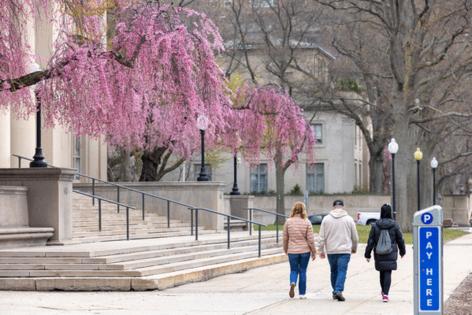Commentary: Fearing Trump, universities themselves restrict academic freedom
Published in Op Eds
Seven out of the nine universities that the Trump administration invited to offer feedback on the so-called Compact for Academic Excellence in Higher Education have politely declined to sign on. At its core, the compact offers preferential treatment in exchange for institutional support for President Donald Trump’s political agenda. This collective rejection was good news.
However, in some of the letters declining the compact, much ink was spilled to reassure the Trump administration that universities were already complying with many of the proposed changes — without even being asked! These practices chill academic freedom, limiting in deed if not in policy what faculty can study, teach and say within and outside of the classroom by creating an environment in which certain words, concepts and projects become unthinkable because they are unsayable. While the compact would have formalized institutions’ agreement to police the research, teaching and speech of professors (and students), it is evident that this sort of policing is already happening.
Academic freedom is central, even critical, to a system that evaluates research on its merits because it allows researchers to pursue questions, develop a research agenda and publish their findings without being beholden to institutions or individuals outside their field. When universities fail to underscore the central importance of academic freedom, they jeopardize their very mission.
People in academia understand this. On campuses across the country, faculty, staff, students and alumni spoke up asking their respective administrations to reject the compact. Some, like MIT, spoke out early and decisively, arguing that its proposed “reforms” contradicted MIT’s “core belief that scientific funding should be based on scientific merit alone.”
Letter after letter from invited institutions reiterated the point that research funding should not be based on political conformity but rather on free competition in the marketplace of ideas. That is, the best science as determined by experts in the field should receive support. Merit, not ideology, should determine the direction of scientific pursuits.
Merit as fundamental to the pursuit of new knowledge hinges on another value that many of the responses to the compact mentioned: academic freedom.
When syllabi are subject to review not for academic rigor or to assess how well they support curricular goals but for ideological conformity as they currently are across many of the state systems in Texas; when institutions urge researchers to scan their proposals for keywords that might draw federal ire; when professors are unable to teach research-based concepts in the classroom without fear of being reported and possibly fired; when universities begin scrubbing websites, eliminating job titles, and recasting offices and their missions as they have in 47 states to align with the president’s preferences, then the free pursuit of knowledge in every scholarly field is on its way to extinction.
Is it possible that some institutions have avoided the ire of the federal government by preemptively undermining academic freedom? Perhaps. But if so, these practices are already doing the work that the compact would have done. They are not protecting scholarship but sacrificing it. Such actions by universities also require strong principled responses from faculty and university leaders. Submitting to political pressure in deed is as harmful as formally entering into compacts that seek to mold higher education to a partisan vision.
Despite the sigh of relief that many breathed when the federal compact was roundly rejected, threats to academic freedom have not been vanquished. If anything, the response by university leaders may have brought to the fore what some of us suspected all along: Academic freedom is being eroded internally by university administrators as well as externally by politicians.
____
Laura Isabel Serna is a media historian at USC. She is currently the president of USC’s American Association of University Professors chapter.
©2025 Los Angeles Times. Visit at latimes.com. Distributed by Tribune Content Agency, LLC.
























































Comments